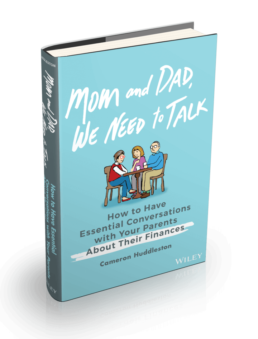My son, who is 7, had a t-shirt he used to wear that said, “I still live with my parents.” I loved that shirt because it always got laughs from people who recognized the irony.
Clearly, if he had been in his 20s wearing that shirt, he would’ve gotten looks of pity. People would’ve muttered, “What a loser,” instead of, “Ha, that’s cute!” Or would they?
Turns out, living with your parents as an adult doesn’t get embarrassing until you’re at least 28, according to a survey by TD Ameritrade. The survey found that more than half of millennials moved back home after college, and one-third lived with their parents for more than two years. And guess what? Parents don’t seem to mind. The survey found that 82% of parents said they would welcome their children moving back home after college.
You might be thinking, “Of course I’d let my kids move back home.” But before you convert their bedroom that you turned into a home gym back into a bedroom, you should think twice before letting your kids move in with you after they graduate from college. At the least, you should lay some ground rules. Here’s why.
You’re Not Really Helping Your Kids Out Financially
It might feel like you’re doing your kids a favor by letting them move back home after college – especially if they have student loan debt. But if you’re allowing them to stay rent-free and helping pay their bills, you could be hurting them in the long run. What incentive do they have to figure out how to survive financially on their own if you’re allowing them to rely on you?
Before you write me off as the meanest mom ever because I’m telling you not to let your kids move back home, I want you to know this. I love my three kids more than anything. Because I love them, I want them to succeed as adults. To do that, I’ve been trying to teach them how to be self-reliant.
Of course, my kids rely on me now for support because they’re young. But by the time they graduate from college, my children should be capable of supporting themselves. If they come knocking on my door asking to move back in and get help paying their bills and my husband and I say yes, they won’t have any reason to become financially independent.
Before you say, “My kids need my help because of all the student loan debt they have,” think back to what financial obstacles you had to overcome once upon a time. I graduated with student loan debt, had a relatively low starting income and lived in an expensive big city. My parents chipped in once when I couldn’t afford to get my wisdom teeth removed, but, for the most part, I was on my own. It forced me to learn how to make ends meet by getting a second job and sticking to a budget.
Rather than allow your kids to rely on you by letting them move back home and giving them financial support, teach them to become financially independent. Ideally, these lessons should start when your kids are young. But it’s not too late as they’re graduating from college or heading out into the real world to show them how calculate their monthly expenses and make sure they have enough coming in to cover those expenses first before spending on nonessential items and activities. Warn them about the dangers of debt. And encourage them to save by having contributions to a retirement account and rainy day fund automatically deducted from their paychecks or transferred from checking account to a savings account each month.
You could give your kids a book such as “Broke Millennial” by Erin Lowry, “Budgeting 101” by Michele Cagan or “The Automatic Millionaire” by David Bach to help them learn the basics of personal finance. You could help them make job contacts to jump-start their career. There’s a lot you can do that will help them out more financially in the long run than giving them handouts.
You Could Hurt Your Finances
Not only could you be hurting your kids’ ability to become financially independent by supporting them, you could be hurting your own finances. A study by Merrill Lynch and Age Wave found that parents are providing $500 billion in support every year to their 18- to 34-year-old adult children. That’s twice as much as they’re contributing to their retirement accounts – which means parents are shortchanging their future to support their adult children.
Yes, your children might have student loan debt. But you probably have debt, too. If you let your kids move back home so they can have more money to pay off their student loan debt, chances are you’ll give them more than a free place to stay. You might pay for their food. You might chip in to help pay their cell phone bill. You might even help them make those student loan payments. That means there will be less money left over in your budget to pay down your debt and build your retirement savings.
You might think that helping your kids out is giving them a head start financially. However, you’re not doing them any favors if you’re sacrificing your financial well-being to “help” your kids. If you don’t save enough for retirement, for health care and for long-term care, you could be dependent on your kids for support as you age. And that could wreck their finances.
How to Protect Your Finances — and Your Kids’ Finances
If you’ve already let your kids move back home or are considering it, you should set some boundaries to protect your finances and to help your kids become financially independent. For example, you could tell your kids that they can live at home for only a certain period of time or require them to pay rent. You could ask them to help pay for groceries and household bills. You also could tell them to chip in with household chores.
If your children want financial assistance rather than a place to live, consider limiting it to expenses that will put them on the path to financial independence. For example, you might agree to help cover education costs, career training or a move to another city for a job.
The key is to decide what level of support you’re willing to provide before you start giving your children any assistance. Then help them create a plan for their financial independence to truly help get off on the right foot.
Don't Miss Out! ORDER NOW!
"An excellent step-by-step guide to navigate what can be time-consuming, uncomfortable conversations."
- Michelle Singletary, The Washington Post
Related Posts
May 7, 2025
How to Talk to Your Parents About Their Stuff You Don’t Want
These tactics might get your parents to…
October 29, 2024
How Much Should You Tell Your Kids About Your Finances?
What you should tell your kids at…

Cameron Huddleston
I am the author of Mom and Dad, We Need to Talk: How to Have Essential Conversations With Your Parents About Their Finances. I also am an award-winning journalist with 20 years of experience writing about personal finance. My work has appeared in Kiplinger’s Personal Finance, Forbes.com, Yahoo!, MSN, and other online and print publications.






That shirt is hilarious! Where can I buy one? Maybe I’ll just create my own.
There are between 4 to 6 guys at any given moment with an a four block radius were still living with their parents and who are over the age of 27. But I don’t see any women and children living with their parents. Any idea whether this is just a weird sample sad or whether it’s mostly men living at home with their parents?
I’ve been living in my neighborhood for five years now and I still haven’t seen a woman over 25 living at home with their parents.
Sam
Loved the article and the comments. I was feeling guilty that I did not let my almost 40 year old daughter move back in with child. For the last 23 plus years she has either moved with her boyfriend or lived with someone. She did not want to listen as a child to what I was preparing her for and after two kids later she is still settled. I did try to allow her to stay with me previously and asked her for 40 dollars to help towards the electric bill ( living in Arizona is no joke) however she moved out and left me with high bills to pay. She has left all her sisters in debt and now she is back in the same situation again. I can’t afford her. Thank you for this article.
Wising Up
Thank you for this article. I too have a 32 ,soon to be 33 yo daughter that I love to the moon and back, but I refuse, simply refuse to enable her anymore. She has dealt with mental health issues, but it’s just like when a doctor performs surgery. He/she does not personally spend the next several months hovering over the patients bed. A good physician connects them with the physical therapist, nurses, and other resources to assist the patient to ‘walk’ again independently. That’s how I have to see it. There are resources all around her , she just has to plug in.
This article is spot on. By the time a kid is even 18, they should already have had a part time job and should be buying their own clothes and other personal items- cell phone, computer, gas and insurance money if they are using a car you own.
And once they graduate high school? Whether they go to college or not, they need to be working and supporting themselves. If they still live at home with you, they MUST pay rent, and it must be steadily increased until it is as expensive to live at home as it is to get an apartment. You’ll be amazed at how resourceful your young adult will become when they don’t get a free ride anymore.
I’ve never taught my children to get a job,I suggested the absolute opposite. Work for yourself,everyone has a talent, you just have to find it,then find people who can utilize that talent for a fee. Just try it. No boss.
My 40 year old daughter moved home about 2 years ago, while she was on her own, I kept paying her rent, I got myself in debt $150,000, I also have a mortgage to pay, I am 62 years old, I don’t know how long I can work for, I don’t have the heart to tell her to move out or to even pay rent or some of the bills, she puts the heating on till she cant breath, we are not allowed to make any noise while she is asleep, cant put the washing on, I have to get ready to go to work tip toeing around the house. We fight everyday and I still cannot tell her she needs to leave. I love her in spite of what she she putting me thru, but I am hurting and don’t know what to do, I don’t want to sound like a bad mum
Oh yes, let’s all take financial advice from folks who could snag a pension-track job without a diploma, buy a detached house for three years’ wages, and feed a family of four on one income while tuition cost less than a used iPhone. Groceries weren’t $9 for a block of cheese, rent wasn’t an entire paycheck, and nobody needed a second job just to keep the lights on. But sure—tell us again how “kids these days” just need to budget harder. Using your past as the benchmark for today’s economy is about as relevant as bragging that you survived without Wi-Fi. Different era, different math.
I’ve never had a pension, did attend college and grad school (with student loans), and my family relies on two incomes now. When I was starting out, I worked two jobs to cover rent and expenses. The max I could afford to spend per week on groceries for me and my husband (who was in grad school without an income) was $50. I know how tought it can be when you’re first starting out. My aim in writing this article is to encourage parents not to simply let kids move back home without requiring them to pitch in some or helping them become financially independent.
It crazy that you think someone can survive on $7.25/hr.
I’ve been out of college for almost 10 years and I don’t make a living wage. Until last year I was always -$200 a month. I don’t go out of my way to buy crazy things. I’ve been in survival mode for almost a decade. This is exhausting 😂